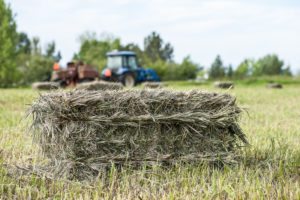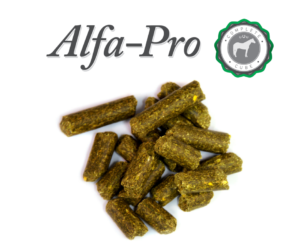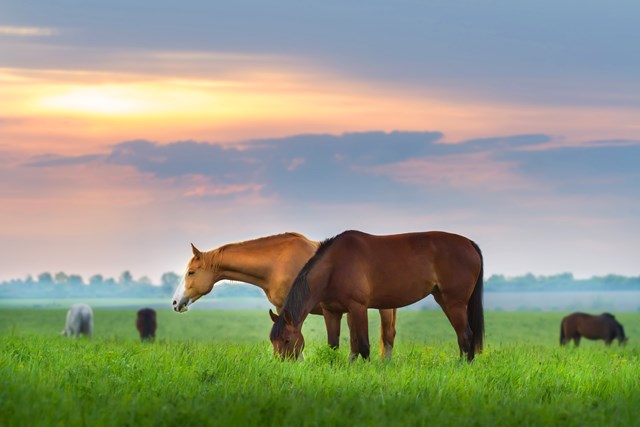By Dr. Chris Morrow, DVM
As a student of the horse it is evident that the species was evolved on varied grass diets. They are designed to walk around eating forage, ready to run away from anything that would eat them. The health of the individual relies on this forage providing adequate energy, protein, vitamins and minerals. As an industry we have modified the use and care of the horse to fit our needs. There are still some using horses that have access to large pastures, but for the most part horses are housed in small areas without access to forage.
Fortunately the horse is a forgiving beast. They are companions, partners and therapists to us all. We have modified their lives to fit ours in that they live in small spaces, and eat what we feed them. More times than not this feed has more than enough quality factors to allow them to live. Modern horsemen are often removed from agriculture, they love their horse but haven’t a clue as to how they should be fed. This is where science and nutrition can improve the human/ horse bond by making it easier to provide quality nutrition consistently.
Hay quality varies from flake to flake, bale to bale, cutting to cutting. Even the best agronomist would have to send samples to get an idea about the quality in any variety of hay. Conversely, quality can be quantified by anyone able to read the tag on a bag of alfalfa pellets. Everything that goes into the bag is on the tag; it can be admired, scrutinized and compared. This allows us to better compare apples to apples as it were, something that cannot be done with a flake or bale of hay.

Hay is the most widely used forage source for horses and cattle. It works, and is usually sufficient. For quality alfalfa hay to be available the weather must cooperate. It must be put up just right, stored correctly, be free of Blister Beetles and not be consumed by other animal agriculture interests (dairies). No matter how good all of the previous expectations are met, as soon as hay is cut the quality diminishes with vitamins E, A and D leaching first. Availability of minerals and proteins also diminish over time.
A rule of thumb is hay quality improves with each cutting as there is more leaf and thinner stem, and as you move north quality improves due to climate. Unfortunately we can’t all have 5th cutting hay from Calgary at our disposal. But we can capture the same measures of quality with premium alfalfa pellets. We can capture that quality regardless of the time of year. We can feed our horses confident that their nutritional needs are being met with every feeding.
Alfa-Pro is a premium ground alfalfa cube that was designed to meet all of the shortcomings of hay for the horse. The benefits include:
- Consistent quality – the tag will allow you to know exactly how much and what you are feeding.
- Convenience – Buy it as you need it. This allows for more efficient use of storage space in the barn and in the trailer when you travel.
- Cleanliness – Feed before you go to work without having to change clothes and worry about hay in the hair.
- Safety – The hay used is Blister Beetle free. Alfa-Pro is formulated to encourage water consumption, decreasing choke and colic episodes.
- Minimize Waste – Pre- and Pro-biotics improve the utilization of Alfa-Pro making less manure. It is estimated that up to 20% of baled hay is lost and up to 40% of round bale hay is lost. There is virtually no pre-consumption waste in alfalfa pellets.
- Minimizing dust and mold will have significant health impacts. Inhaled allergens are capable of sensitizing upper airways and lungs. This will predispose those individuals to disease conditions such as Inflammatory Airway Disease and Exercise Induced Pulmonary Hemorrhage.
 The shortcomings of other alfalfa products (hardness, choke, low water consumption, high corn content) have been addressed in Alfa-Pro’s formulation. That said some horse with stereotypic behavior such as weaving or cribbing may benefit from hay in a slow feed net to occupy their time. Stereotypic behaviors are usually best treated by consistent exercise and minimizing easily digestible sugars in the diet. Alfa-Pro has a relatively low corn content making it safer for laminitic horses, and less likely to encourage stereotypic behaviors.
The shortcomings of other alfalfa products (hardness, choke, low water consumption, high corn content) have been addressed in Alfa-Pro’s formulation. That said some horse with stereotypic behavior such as weaving or cribbing may benefit from hay in a slow feed net to occupy their time. Stereotypic behaviors are usually best treated by consistent exercise and minimizing easily digestible sugars in the diet. Alfa-Pro has a relatively low corn content making it safer for laminitic horses, and less likely to encourage stereotypic behaviors.
Alfa-Pro is safe, consistent, palatable and balanced for feeding mature horses. We have worked to continually improve the formulation to fit the needs of the horses we serve. Take a look at Alfa-Pro giving you more time to spend with your horse manufactured by Hi-Pro Feeds, a company that is supportive of agriculture activities throughout our local communities. For more information, click here.
For more information on Dr. Chris Morrow, click here.

